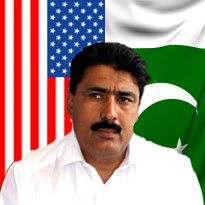 On Thursday, a US Senate committee voted to cut aid to Pakistan by $33m – one million for each year of the sentence given to Dr. Shakil Afridi (pictured right) for his alleged role in helping the CIA track down and kill Al Qaeda leader Osama Bin Laden in May 2011. Afridi is believed to have conducted a bogus vaccination drive in Pakistan’s Abbotobad region that allowed the CIA to test the collected blood samples for Bin Laden DNA. This week, a court composed of tribal elders in Pakistan’s semi-autonomous Khyber Agency frontier region convicted Afridi for conspiring against the state (aka treason). Barring some kind of appeal, Afridi’s sentence virtually ensures he will die in prison.
On Thursday, a US Senate committee voted to cut aid to Pakistan by $33m – one million for each year of the sentence given to Dr. Shakil Afridi (pictured right) for his alleged role in helping the CIA track down and kill Al Qaeda leader Osama Bin Laden in May 2011. Afridi is believed to have conducted a bogus vaccination drive in Pakistan’s Abbotobad region that allowed the CIA to test the collected blood samples for Bin Laden DNA. This week, a court composed of tribal elders in Pakistan’s semi-autonomous Khyber Agency frontier region convicted Afridi for conspiring against the state (aka treason). Barring some kind of appeal, Afridi’s sentence virtually ensures he will die in prison.
It wasn’t just the severity of Afridi’s punishment that prompted US politicians to express their outrage by cutting Pakistan’s allowance. In US eyes, Bin Laden’s killing was an unqualified good; as an alleged ally, Pakistan should be celebrating along with the US, not imprisoning someone who may have helped achieve this result. This US reaction is predictable, even more so considering it’s an election year. But the Pakistani reaction to Afridi’s alleged involvement in the Bin Laden killing is equally predictable, if you stop to think about it.
Consider the continued presence on US soil of Cuban-born former anti-Castro CIA asset Luis Posada – a chief suspect in the explosion of a Cuban airliner in October 1976 that killed all 73 people on board plus bombings at Havana hotels in September 1997 that killed one man and injured 11 more. Imagine Cuba’s elite ‘Iguana Team Six’ commando unit slipping into Miami one night, putting a bullet through Posada’s eye then slipping back out of the US as quickly and clandestinely as they entered. Imagine Raul Castro going on Cuban TV and announcing this operation’s success, followed by images of throngs of Cubans dancing in the streets, waving Cuban flags and high-fiving each other. Now imagine the US discovered that one of their own citizens in Miami had assisted the Cubans in some small way. Would you expect the US to (a) look the other way or (b) hang a new nameplate on a door in Guantanamo?
THE WRONG SIDE OF HISTORY
It may not seem obvious, but there’s a parallel to be drawn here between Pakistan’s prosecution of Afridi and the US prosecutions of international online gambling companies over the past decade or so. Rightly or wrongly, Pakistan feels the Bin Laden raid’s explicit violation of their territorial sovereignty by a foreign power made them look militarily and politically impotent in the eyes of their own citizens as well as on the world stage. Again, rightly or wrongly, Afridi’s prosecution seems an obvious attempt by Pakistani authorities to reassert their claim to represent the ultimate authority in Pakistan.
Now consider the US online gambling situation. Despite what US authorities may have wished, large numbers of US citizens chose to bet with these companies, which were operating with the full legal blessing of their home jurisdictions. When US media outlets began accepting more and more of these companies’ advertising dollars, and US bettors’ unwillingness to obey the authorities’ wishes became more and more public, the authorities felt compelled to act. Each of the above scenarios represents a publicly embarrassed government punishing what many consider to be an innocent party in order to save face both domestically and abroad.
It’s clear the US felt justified in taking its action against Bin Laden – and much of the world agrees with them. It also appears increasingly likely that Afridi may not have known all that much regarding the ultimate aim of the CIA operation in which he was involved, making the US protests on his behalf that much more appropriate. Pakistan may eventually come around to the belief that – in Afridi’s case, at least – they’ve taken a stand that will be viewed as being on the wrong side of history. The US is expected to soon allow domestic companies to offer the same type of online gambling services it has long prosecuted foreigners for providing, which would suggest that – in the case of online gambling, at least – it was they who have been on the wrong side of history.